Difference between revisions of "Portal:Inalienable Rights"
m |
m |
||
| Line 15: | Line 15: | ||
Candidate article subjects: | Candidate article subjects: | ||
| − | * The philosophical | + | * The philosophical writings about rights that influenced America's founding |
| − | ** | + | **Locke, Paine, others |
| − | ** How | + | **Papers, letters, and pamphlets in 18th century America that dealt with rights (These can also be assigned to [[Portal:American Independence|American Independence]]) |
| + | ** How such rights are reconciled with government? | ||
**Burke vs. Paine | **Burke vs. Paine | ||
* America's Common Law Heritage | * America's Common Law Heritage | ||
* 'Rule of Law' explained | * 'Rule of Law' explained | ||
| − | |||
* Rights as defined in our constitution and its amendments (These can also be assigned to [[Portal:Federalism and Democracy|Federalism and Democracy]].) | * Rights as defined in our constitution and its amendments (These can also be assigned to [[Portal:Federalism and Democracy|Federalism and Democracy]].) | ||
* Other definition of 'rights' used in the American political discussion and their legitimacy. | * Other definition of 'rights' used in the American political discussion and their legitimacy. | ||
Revision as of 10:33, 8 August 2014
Inalienable Rights
|
We use this topic/category to expound on the fundamental rights that are to be protected as the legitimate function of a government. Let us start by understanding that discussing rights is the fun part - the easy part, if you will - though calling it easy is a little like taking it for granted, and it must not be; since there are always those who do not recognize such rights, who will argue against them, and even commit violence against them in the name of principles that deny their existence. This makes understanding rights important. So, a discussion of rights seems the place to begin, but the road gets steeper as we progress from rights to how they should be preserved. Preserving rights is difficult to get right. The 18th century was a time of intense activity around the subject of rights and government in America, England, and continental Europe - particularly France. England got it right, the United States significantly improved on their example while France failed almost completely. The phrase 'inalienable rights' was likely first used in 1725[1][2]. It is synonymous with 'natural rights' and 'God given rights' "Inalienable" means that such rights are immutable - their existence is unconditional. They can neither be given up by the individual or removed by another. They can, of course, be violated. This concept of such rights is the foundation of the rule of law - which is the foundation of our government. That leap from rights to understanding the correct role to be played by law is the crucial ingredient. Rule of Law is the foundation of all truly successful governments. England was first to rely on it through its Common Law. Then America developed it further and placed it at the center of the new government for the United States. Though both have at times strayed, these governments were set up as guardians of these fundamental rights and the people to whom they belong. This portal is the place to assign categories and articless that present and discuss the concept of rights as it concerned colonial Americans, America's founders, and how rights are understood today. Candidate article subjects:
|
 |
Categories and contentsClick on arrows to see subcategories and articles. Things you can do
|
TBD
|